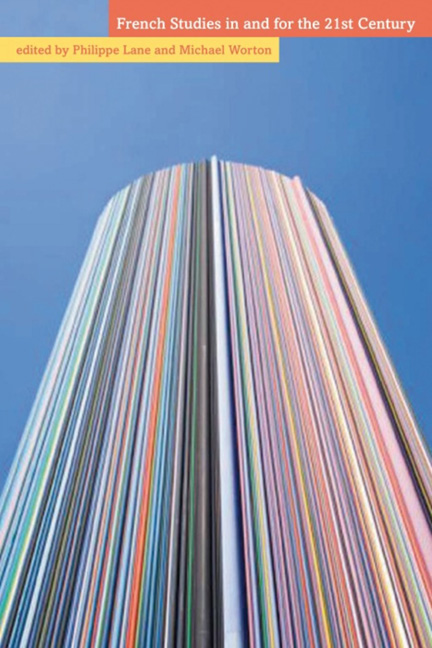Book contents
- Frontmatter
- Contents
- Notes on Contributors
- Foreword
- Foreword by His Excellency
- Part I: Contextualisations
- Part II: Research and Public Engagement Strategies
- Part III: The Place of Women and Gender in French Studies
- Part IV: The Place of Literature
- Part V: The Place of Linguistics in French Studies Today
- Part VI: Theatre, Cinema and Popular Culture
- Part VII: Area Studies, Postcolonial Studies and War and Culture Studies
- Part VIII: Adventures in Language Teaching
- Appendices. Addresses to the Future of French Studies Conference
- Appendix 1. Opening Speech. A Vast and Dynamic Field of Research and Teaching
- Appendix 2. A View from France
Appendix 2. A View from France
from Appendices. Addresses to the Future of French Studies Conference
- Frontmatter
- Contents
- Notes on Contributors
- Foreword
- Foreword by His Excellency
- Part I: Contextualisations
- Part II: Research and Public Engagement Strategies
- Part III: The Place of Women and Gender in French Studies
- Part IV: The Place of Literature
- Part V: The Place of Linguistics in French Studies Today
- Part VI: Theatre, Cinema and Popular Culture
- Part VII: Area Studies, Postcolonial Studies and War and Culture Studies
- Part VIII: Adventures in Language Teaching
- Appendices. Addresses to the Future of French Studies Conference
- Appendix 1. Opening Speech. A Vast and Dynamic Field of Research and Teaching
- Appendix 2. A View from France
Summary
Monsieur l'Ambassadeur,
Professor Michael Worton,
Ladies and gentlemen, Professor of French Studies
Dear Colleagues,
I am both delighted and honoured to be here in the prestigious building of the British Academy and to speak at the opening of your conference on French Studies in the UK, which has been organised by the French Embassy and University College London, as part of the celebration of the centenary of the French Institute in London. Of all the events organised to celebrate this centenary, this conference is undoubtedly the one which delves deepest into the history of the cultural representation of France in your country and also the one that focuses most on one of the most exciting aspects of our Franco-British relations.
In historical terms, we can, I think, place our exchanges today under the tutelary image of Marie d'Orliac, who a century ago, founded the Universitè des Lettres Françaises, a prefiguration of the French Institute in London. We are also reminded here of the origin of cultural diplomacy in France, which celebrated its own centenary last year. Indeed, it was in 1909 that the Quai d'Orsay created a ‘Service des Oeuvres’, which was responsible in particular for the support and organisation of French schools abroad, for cultural exchanges, and for the first French institutes opened in the main European capital cities with the help of French universities.
The French Institute in London was linked to the University of Lille, and the institutes in Madrid and Lisbon were later linked to the universities of Toulouse and Bordeaux. The idea at the time was to offer higher education courses mainly in literature and the social sciences to foreign students and researchers. Such courses enabled French universities to strengthen the existing relationships and to forge new relationships with their counterparts in other countries, and to organise exchanges between teachers, researchers and students. This initiative thus revitalised and gave new directions to both the teaching of, and research into, French language, literature and civilisation. The discussions at this conference will no doubt tell us much about the role played by the Institut français in London in the development of French Studies in the UK, in your universities, and more generally, in British intellectual circle.
- Type
- Chapter
- Information
- French Studies in and for the 21st Century , pp. 296 - 299Publisher: Liverpool University PressPrint publication year: 2011



